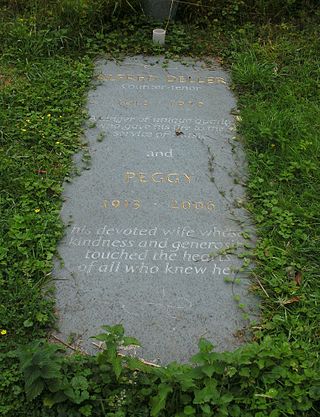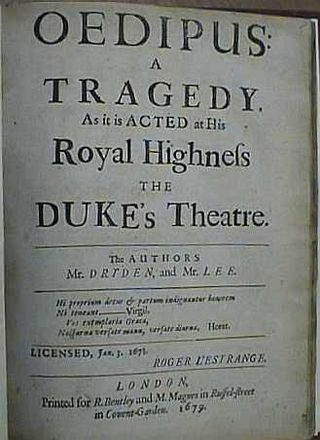Related Research Articles

Henry Purcell was an English composer of Baroque music.

Alfred George Deller, CBE, was an English singer and one of the main figures in popularising the return of the countertenor voice in Renaissance and Baroque music during the 20th century.

Trevor David Pinnock is a British harpsichordist and conductor.

Ode for the Birthday of Queen Anne is a secular cantata composed by George Frideric Handel to a libretto by Ambrose Philips, of which the first line, "Eternal source of light divine", provides an alternative title for the work. It was probably composed during January 1713 for a performance on 6 February 1713, although there is no record of the performance having actually taken place. Other catalogues of Handel's music have referred to the work as HG xlvi A; and HHA i/6.

Geoffrey Alan Burgon was an English composer best known for his television and film scores. Among his most recognisable works are Monty Python's Life of Brian for film, and Tinker Tailor Soldier Spy and Brideshead Revisited for television, the latter two earning Ivor Novello Awards in 1979 and 1981 respectively. He also won BAFTAs for his themes for the remake of The Forsyte Saga and Longitude.

The Fairy-Queen is a semi-opera by Henry Purcell; a "Restoration spectacular". The libretto is an anonymous adaptation of William Shakespeare's comedy A Midsummer Night's Dream. First performed in 1692, The Fairy-Queen was composed three years before Purcell's death at the age of 35. Following his death, the score was lost and only rediscovered early in the twentieth century.
Hail! Bright Cecilia (Z.328), also known as Ode to St. Cecilia, was composed by Henry Purcell to a text by the Irishman Nicholas Brady in 1692 in honour of the feast day of Saint Cecilia, patron saint of musicians.

"Music for a While" is a da capo aria for voice, harpsichord and bass viol by the English Baroque composer Henry Purcell.
Mark Deller is an English conductor and countertenor, now retired. He is the son of the first modern countertenor, Alfred Deller.
Raymond Wilding-White ; was an American composer of contemporary classical music and electronic music, and a photographer/digital artist.

Joshua is an oratorio by George Frideric Handel. It was composed in a month, from 19 July 1747 to 19 August 1747, six months before the beginning of the oratorio season. Joshua is Handel's fourth oratorio based on a libretto by Thomas Morell. The oratorio premiered on 9 March 1748 at the Covent Garden Theatre, London. Joshua is based on the Biblical story of Joshua as the leader of the ancient Israelites. The story follows the Israelites from their passage over the Jordan River into Caanan and through the Battle of Jericho. The work also includes a love story elaborated from a few hints in the Biblical narrative between Caleb's daughter Achsah and Othniel, a young soldier.

The Brockes Passion, or Der für die Sünde der Welt gemarterte und sterbende Jesus, is a German oratorio, libretto by Barthold Heinrich Brockes, first published in 1712 and seeing 30 or so more editions over the following 15 years.

The Light of the World is an oratorio composed in 1873 by Arthur Sullivan. Sullivan wrote the libretto with the assistance of George Grove, based on the New Testament. The work was inspired by William Holman Hunt's popular 1853–54 painting, The Light of the World. The story of the oratorio follows the whole life of Christ, told mostly in the first person, focusing on his deeds on Earth as preacher, healer and prophet.
Coronation Ode, Op. 44 is a work composed by Edward Elgar for soprano, alto, tenor and bass soloists, chorus and orchestra, with words by A. C. Benson.

The Indian Queen is a largely unfinished semi-opera with music by Henry Purcell, first performed at the Theatre Royal, Drury Lane, London, in 1695. The exact date is unknown, but Peter Holman surmises it may have been in June.

Utrecht Te Deum and Jubilate is the common name for a sacred choral composition in two parts, written by George Frideric Handel to celebrate the Treaty of Utrecht, which established the Peace of Utrecht in 1713, ending the War of the Spanish Succession. He composed a Te Deum, HWV 278, and a Jubilate Deo, HWV 279. The combination of the two texts in English follows earlier models. The official premiere of the work was on 13 July 1713 in a service in St Paul's Cathedral in London.
Sub olea pacis et palma virtutis conspicua orbi regia Bohemiae Corona: Melodrama de Sancto Wenceslao , ZWV 175, is an extensive composition, written in 1723 by Czech baroque composer Jan Dismas Zelenka.

The Te Deum in D major, "Queen Caroline" is a canticle Te Deum in D major composed by George Frideric Handel in 1714.
Welcome to all the pleasures, Z. 339, is a 1683 composition by Henry Purcell, the first of a series he wrote in honour of the patron saint of music, Saint Cecilia. It was commissioned by an organisation called "The Musical Society" for performance in London on 22 November 1683.
References
- ↑ "Come ye sons of art", The Oxford Dictionary of Music. Oxford University Press ( ISBN 0-19-861459-4).
- 1 2 3 4 Chris Woodstra; Gerald Brennan; Allen Schrott, eds. (2005). All music guide to classical music : the definitive guide to classical music. San Francisco, CA: Backbeat Books. ISBN 0-87930-865-6.
- ↑ Deller, T (2012). "Alfred Deller: a voice from the past".
- 1 2 King, Robert (1992). "Come ye sons of Art, away, Z323". Hyperion.
- 1 2 Rebecca Herissone. ed. Come ye Sons of Arts. London: Stainer & Bell, 2010.
- ↑ "Come ye Sons of Arts".